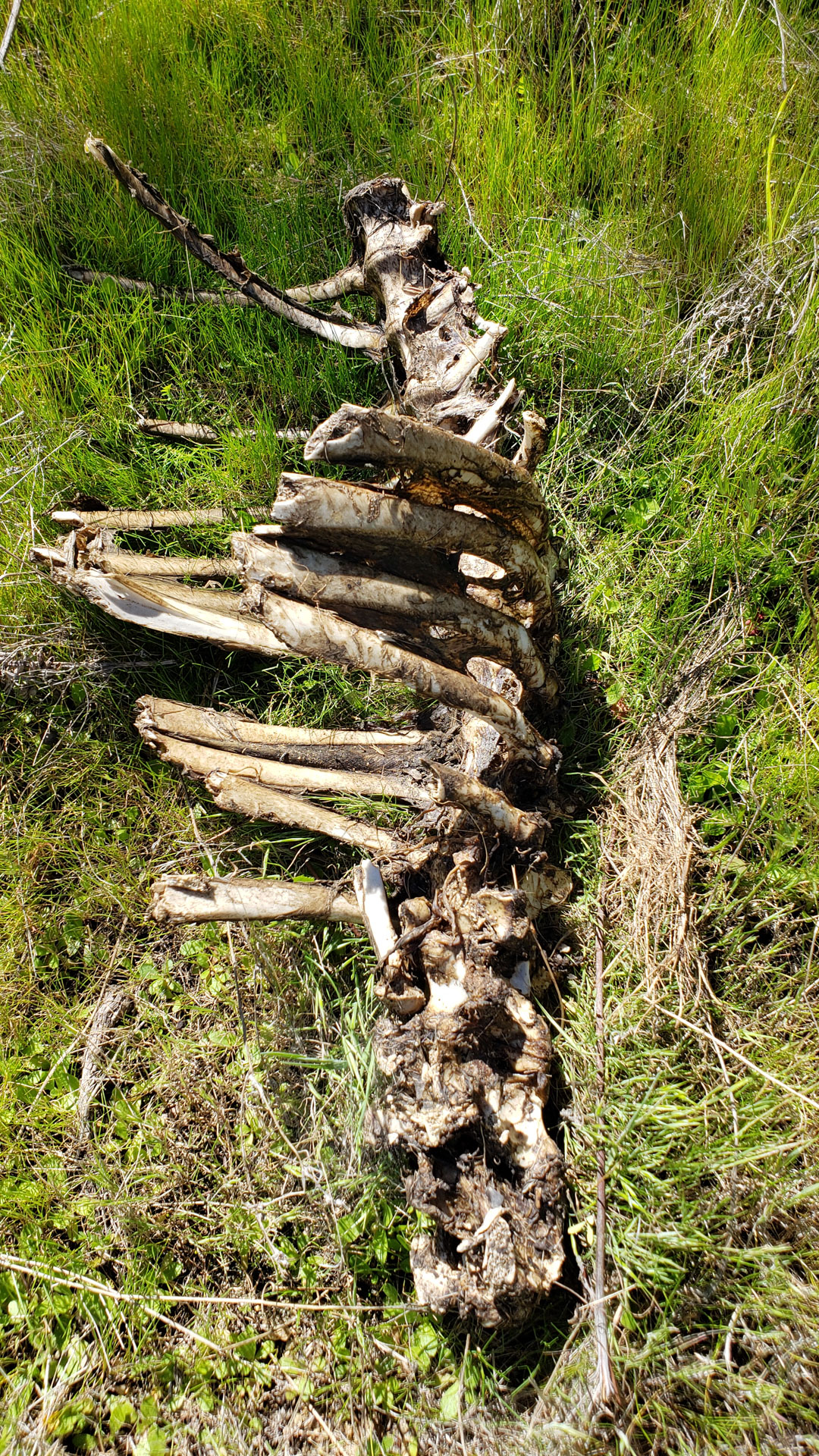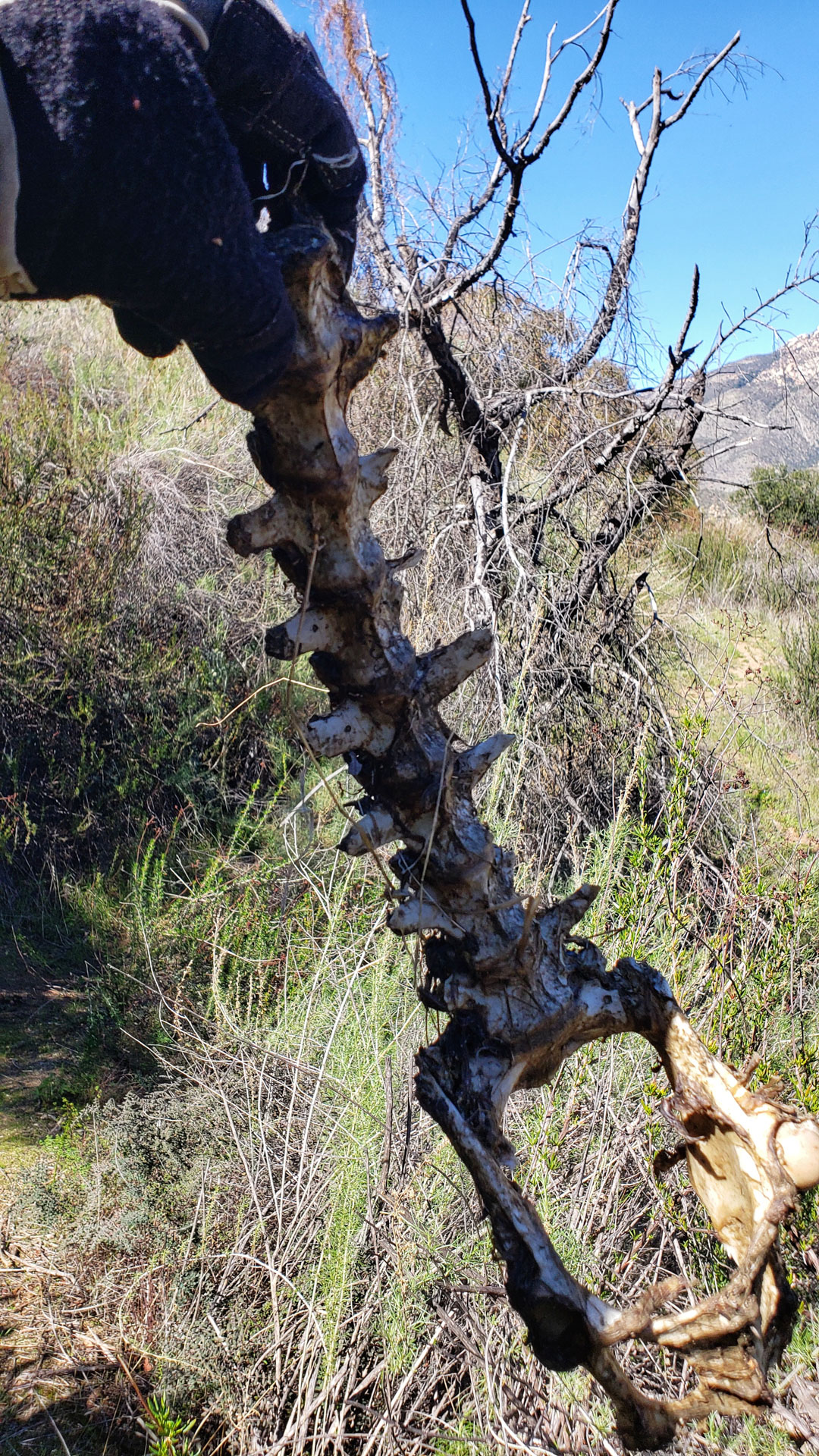Here is another video from the Lost Sierras visit back in July. The Mills Peak trail. Doing this trail as loop would be a mofo but my lovely wife drove me to the top! This trail rocks with plenty of character and views. From the bottom of the trail it is an easy spin back into Greagle where tasty grub and beer and be had. It is certainly well worth a go!
Tag: Video
San Diego Flume Trail
I have a new video up for the San Diego Flume Trail as well as new page on my site. This is nice little gem of a trail tucked away in El Monte valley where you might find a nice serving of Chicken Noodle Soup for the MTB Soul this time of year.

I spent a few a more hours out in the El Monte Valley area this past week refreshing my memory on a couple of trails in the area. While out on the flume trail east of El Monte Park out I came across of leftover Kittle snacks.



I have added a page to my site for this trail. In the course of making the page I also added the trails in that area to the Trailforks database as well as mirroring my recommended route discussed on that site as well. I will be doing some more of that in future but that is for another day.
I also finished up a video from Nichol and I riding this trail during our camping outing at Lake Jennings.
and maybe even a find a nice serving of Chicken Noodle Soup for the MTB soul.
If you have not done the San Diego Flume trail before, it is worth taking a checking out this time of year when its exceptionally green out there. It really is an nice little gem tucked away near Lakeside.
You can get in 10 miles or so, a climb or two, a quick a hike-a-bike or two and maybe even find a nice serving of Chicken Noodle Soup for the MTB soul.
Idyllwild 05 Video
Here is the next video in the remastering project. This from a ride or two on the Hub Trails of Idyllwild. As this was in the pre-GoPro era, this was shot with a helmet-mounted standard definition digital video camcorder. You will see the shadows of this beast in the video from time to time.
Cuyamaca – BLT Video Remastered
I have been working on remastering some of my older videos to bring them up to new standards. My videos range from ancient lip-stick camera and 8mm camcorders to GoPros. All of various eras of equipment will have their own challenges to remastering and some of them I’m just not going to make the time for the effort required. But I am going to make an effort.
The video above is from 2007 where some of the usual suspects of the time rode from the Cuyamaca mountains over to the Lagunas by way of the Deer Springs and Indian Creek trails. It was about a 40 mile day of great fun!
This video was shot with a 1080i Canon HDV camcorder. It shot good video with the exception of the image stabilization. It used optical image stabilization which was consider really good for the time. However it was optimized for handheld work and not for the rapid bouncing around that occurs during use as a helmet camera work. I’m pretty sure that the optical image stabilization often made things worse not better. It certainly did not work as well as the electronic image stabilization that was on my previous standard definition camcorder setup.
I had previously remastered my Galbraith Mountain video from 2009 but did not try to do any software stabilization of the video. Many moons ago I tried software stabilization and did not like all the artifacts it created in the video.
For the Cuyamaca – Laguna video I gave the software stabilization another shot. I’m using Adobe Premiere CC 2018 and it has warp stabilizer effect/filter built in. After a bit of trail and error I found some setting that work well enough. There is a balancing act that has to be done with with the 1080i footage between smoothness and clarity. The filter will do a good job of stabilization but at the cost of cropping the footage. When the footage is cropped the clarity of the footage is decreased. I found that trying to keep the crop below 125% typical kept thing looking good. Some scenes I did not stabilize at all. Overall I’m satisfied enough with it as it is better than the windows media format stuff I was previously using. There will be some more of this coming in the future.
Video Tinker Time in Alpine
This past week I made a long overdue appearance at Steve’s Wednesday Stoke ride in Alpine. The weather was great which made the climb up to the top go pretty well.

I was playing with both my Digital SLR camera as well my GoPro Hero 3 today. This was the second outing with thing so I doing quite a bit of tinkering with mountings and camera setup.

One of the angles I really like was using the roll bar mount near the bottom of the downtube to view the front tire action. One downside to the roll bar mount was I needed use one of the extender arms on the mount to get the angle right. No matter how hard I tightened the the knob for teh extender arm. It would still sag down after some hard compressions like a landing or bigger chunk. I will have figure out some kind of secondary support strap or something to use this angle much.

My Canon 7D DSLR can also shoot HD video so I played around with shooting video with it. It will be interesting to show how the whole video editing workflow is going to pan out with multiple formats and frame rates going into a single project.

I also used the seat post/handlebar mount for a rear facing shot. I did not use an extender arm for this mount as the angle looked good.

The “good” angle was based on the seat post being up. Once I started going downhill and play in the chunk I lowered the seatpost and found that I was unable to get the camera angled up enough for my liking with too much of tire being in the frame and not enough view behind to keep from chopping off the head of a rider behind me.

For the main run back down the trail I had the side mount for the helmet on. The trail conditions were pretty freaking awesome that begged you to stay off the brakes.
GoPro HD3 Shakedown Ride
Early this week I got out for a lunch time ride out at La Costa. The weather was nice and you good see Catalina and San Clemente Islands out on the horizon. 
I got a GoPro Hero3 HD Black Edition for Christmas and it was high time that I tested it out. Other than some futzing with it on the couch this was my first time rolling with camera. I decided to go for a side mount on the helmet for this test. I slapped the curved sticky mount on about the right looking spot and stuck it on. I was also using the double hinged adapter that came with the kit. The kit also came with a WiFi remote but I did not even break that out on this test. Instead I used the GoPro app on that I installed on my Android phone to control the camera. The cool thing I like about the app is that it allows you to preview the angle you have setup instead of guessing or having to buy LCD accessory for the GoPro. Right off the bat I’m rather impressed with the video quality and I’m sure it could be made a bit better some some of the advanced settings I have not tinkered with yet. Of course there is no way to get image stablization with this setup but overall this thing is nice enough that and maybe another one are going to make it into the video equipment stable. Oh yeah…tighening down those little adjustment knobs is highly recommended. Here is a short completely non-fancy clip.
“Rocking In SoCal” Video
Okay I have been letting this footage pile for over a year so it was time to do something with it. It is a locals rock hangout here in San Diego. You can call it either the KTS #1 (Kinda Top Secret) Trail or the Ain’t Telling Trail. It is really not much of a secret at all but I was asked not to drop the name so there you go.
Right Click to download the 9 minute and 46 second video that will set your hard drive back 139MB.
New HelmetCam Setup
I have needed to retire the helmet portion of my old helmet cam setup for quite sometime now as I had simply worn it out. The adjustment mechanism on the back of the helmet was shot and overall the helmet looked pretty worse for wear. I have been tinkering with a new helmet camera mounting design that would allow me to get away from having a dedicated helmet for the camera system. Wearing the helmet camera on long climbs when you are not filming is a bummer so I would often carry a second helmet. I wanted carry a single helment and be able to quickly attach or remove the camera gear during the course of a ride. The new setup basically uses the quick-release mounts designed for professional/prosumer grade camera tripods. I find it much more versatile than before.
Here the main concept piece of the new setup, the quick release mounts. One piece (the plate) is on the helmet, the other (the latch) is on the camera housing. There was two main reasons I put the plate on the helmet vice the camera housing. The first was was because additional plates are inexpensive compaired to the latch. The other was the the plates weighed much less than the latch and I was looking to minimize the permenant weight on the helmet.
Here is a close up the mounting bracket for the plate. I needed to create a vertical surface for the plate. I ended up mixing up a small batch of fiberglass resin from a small repair kit that you can find at most automotive stores for under $20. I used the cap off of a can of spray paint as my mold and made up two small pucks. Once cured, I used a dremel tool with a sanding attachment to shape the puck until it contoured the side of the helmet and was vertical. I used a 1/4″ thick piece of neoprene as a vibration damper/gasket between the bracket and the helmet.
I used a single bolt through the plate, the bracket and helmet and secured with a recessed T-bolt on the inside of the helmet. I used a neoprene backed washer between the bolt and the plate as an added bit of vibration damping. I found these washers at a screw and bolt speciality surplus store in San Diego (They have like 5,000 of everything). Tightening the screw was enough to hold the camera angle inplace but once I had aligned the camera vertically , I drilled a recess in the bracket to allow the small alignment button used on the plate to ensure the plate stayed in alignment.
You may have noticed that the counterweight bracket is at a different angle than the other side. Since I can now switch the camera housing to the other side, I’m experimenting with some different shooting angles on that side.
Another thing I like about the setup is I can now move the camera gear from an XC helmet over to my full-face helmet easily. I actually made the full face rig first as it was much simpler. The extra padding of the full face helmet seem to have added a bunch of vibration damping that smoothed out the video some. Now I just need to get out on the trail with XC setup.
Tacos For New Year’s Eve
Tacos were sounding good today. I went to Alpine to take some more flight lessons.
So I’m calling this a successful jump and landing, with a really bad bit of trail riding immediatly afterwards. My biggest mistake was not really looking at the landing closely before jumping. I have done that jump before but did not take notice of a rut that had developed after the rains and was just chilling there in the shade. If I had I would have made more of an effort to not to go as far left as I did. I really thought I was just going to scrap the bushes a bit and keep on riding.
Here are some shots of the aftermath.
This one taco deluxe!
I thought for sure I would be walking out of there as it was firmly in the hella jacked range.
Surprisingly enough I found that after showing the wheel some luving Ike Turner style, it was okay enough to get rolling again.
One thing is for certain, I confirmed that I am getting the full 160mm out travel out of my front fork. I got a scrap on the my thigh just above the pads and I aggravited an old injury to my right shoulder a bit. I even managed to hit a few smaller things on the return trip back down the mountain but a latter inspection revealed showed that this rim is going to have to be put out to pasture.
Long Overdue Fisher Mesa Video
Okay so this video took just a wee bit longer to get out that I expected. Truth is I got a little burnt out on editing video so I just set the footage aside. I rode Fisher Mesa in May on Day 5 of my Utah Colorado 08 Road trip. Fisher Mesa is a really cool out-and-back XC ride that falls into the “eat your desert first” category as the mesa descends from the trailhead all the way to the turn around point which can be up to 12 miles at the point. It is well worth the return effort. Fisher Mesa is a good chunk of distance from Moab. To give you a rough idea of where it is at, If you have ridden Porcupine Rim, the valley to the east is Castle Valley with it’s signature Castle Rock and the Priest and Nuns. The mesa across the valley to the east is Adobe Mesa. To the east of Adobe Mesa is Mary Jane Canyon and beyond that is Adobe Mesa. The Adobe Mesa Rim trails is on the east side of the mesa and it over killer views of the Fisher Towers, Top of the World and Fisher Valley. Like most of my photographic and video experience in this area of the country, it is tough to capture the beauty of the place.
Right Click here to download the 87MB video that run 6 minutes and 35 seconds.















